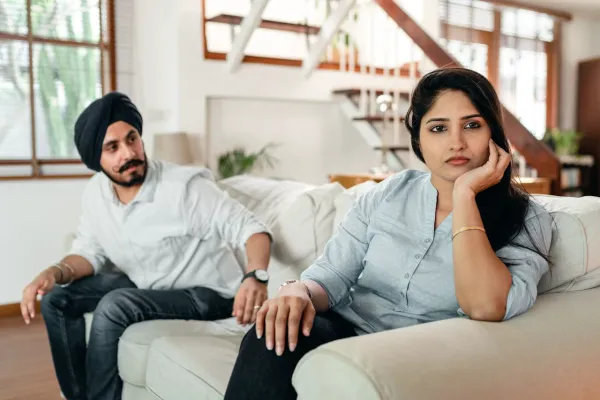Married Couples Often Share Mental Health Patterns, Psychiatric Disorders: New Study
admin | September 12, 2025 5:22 PM CST

In a world where mental health is gradually coming into open conversation, a new and large-scale study has thrown up findings that may surprise many: spouses are more likely to share psychiatric troubles than previously assumed.
The research, published in Nature Human Behaviour, examined nine psychiatric disorders and found that if one partner has any of them, the other has elevated risk of having it too, either the same disorder or a different but related one. The study, spanning people born from the 1930s through the 1990s, shows that for most disorders, from depression and anxiety to ADHD and substance use, there is a consistent correlation between partners, across cultures and generations. This trend holds true over decades, as observed in over 5 million spousal pairs across Taiwan, Denmark and Sweden.
In India, where social and familial bonds are tight, and marriage involves not just partners but extended family, such a finding has particular importance. From arranged marriages to caregiving roles, the way Indians understand, respond to, and live with is shaped by cultural, economic, and societal factors. Let's explore what the international study found, how Indian couples might interpret and internalize those findings, and what steps might help.
What The Study Found
It is very important to note right at the outset that while this new study in is relevant for spouses everywhere, the study itself was not based on Indian societal, cultural or family settings. Keeping this in mind, here are the key findings of the study:
 Photo Credit: Pexels
Why It Might Be Happening
The authors behind this peer-reviewed study suggest several possible mechanisms through which this spousal correlation is happening:
Photo Credit: Pexels
Why It Might Be Happening
The authors behind this peer-reviewed study suggest several possible mechanisms through which this spousal correlation is happening:
- Data was drawn from nearly 5 million married/spousal pairs in Taiwan and comparisons with large national registries in Denmark (571,534 pairs) and Sweden (707,263 pairs).
- Disorders studied included schizophrenia, bipolar disorder, depression, anxiety, ADHD, autism, OCD, substance-use disorder, and anorexia nervosa.
- Spousal correlation means that when one spouse is diagnosed with one of these disorders, the chance that the other spouse also has a psychiatric disorder is significantly higher than random. The same-disorder correlation (both partners having the same disorder) is especially strong in many cases.
- These patterns are stable over time (for people born across decades) and consistent across the different countries, despite differences in health systems, stigma, culture, diagnostic practices.
 Photo Credit: Pexels
Why It Might Be Happening
The authors behind this peer-reviewed study suggest several possible mechanisms through which this spousal correlation is happening:
Photo Credit: Pexels
Why It Might Be Happening
The authors behind this peer-reviewed study suggest several possible mechanisms through which this spousal correlation is happening:
- Assortative mating: People tend to pick partners who are similar to them, not just on visible traits like education or religion, but possibly on mental health traits (diagnosed or subclinical).
- Shared environment / life stressors or convergence: Spouses share day-to-day life encompassing household stress, economic pressures, family responsibilities, all of which might contribute to worsening or revealing psychiatric symptoms in the partner who was previously undiagnosed or mild.
- Stigma and choice constraints: People with psychiatric disorders may have smaller pool of potential partners due to stigma, reducing choice, leading to higher chance of marrying someone with similar conditions.
- Awareness And Screening: Indian couples may often dismiss early symptoms of psychiatric disorders, attributing them to stress, work, or family tensions. If one spouse has depression, anxiety or substance use disorder, the partner might also benefit from being alert to similar symptoms.
- Reduced Stigma And Early Help: India has significant stigma around mental health; many avoid seeking diagnosis or treatment. Understanding that disorders can "run in the partnership" may encourage earlier help-seeking, both for oneself and for one's partner.
- Marriage And Counselling Context: In arranged or semi-arranged marriages, where partners meet later, mutual knowledge about mental health may be limited. Premarital counselling, or at least disclosure and understanding, may become more relevant.
- Impact On Children: The study notes that children with two parents diagnosed with the same psychiatric disorder are at higher risk than those with only one. In Indian settings where multigenerational households are common, early detection and treatment could help reduce intergenerational burdens.
READ NEXT
-
What do yellow stains on pillows reveal about your health and sleep

-
Vegetarians and non-vegetarians will sit together in IIT Kharagpur; the decision of separate seating has been withdrawn.

-
5 asanas to do in bed before sleep

-
If the car's engine gets damaged due to E20 petrol, will you not get a claim? Know its rules

-
Delhi New Excise Policy: Reducing legal drinking age for beer to 21 and allowing private licenses for alcohol sales
